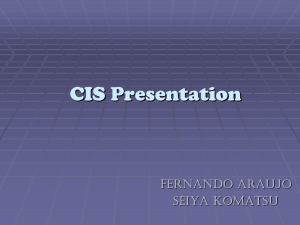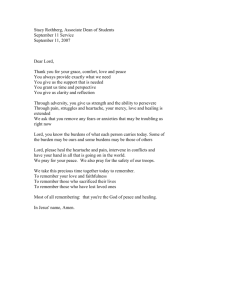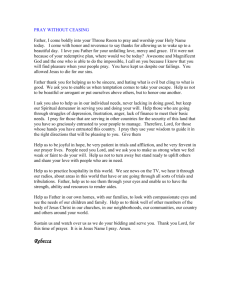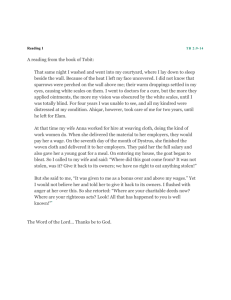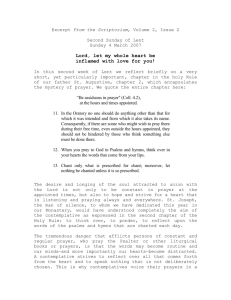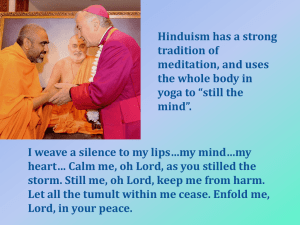Social Justice Sunday Liturgy Notes
advertisement
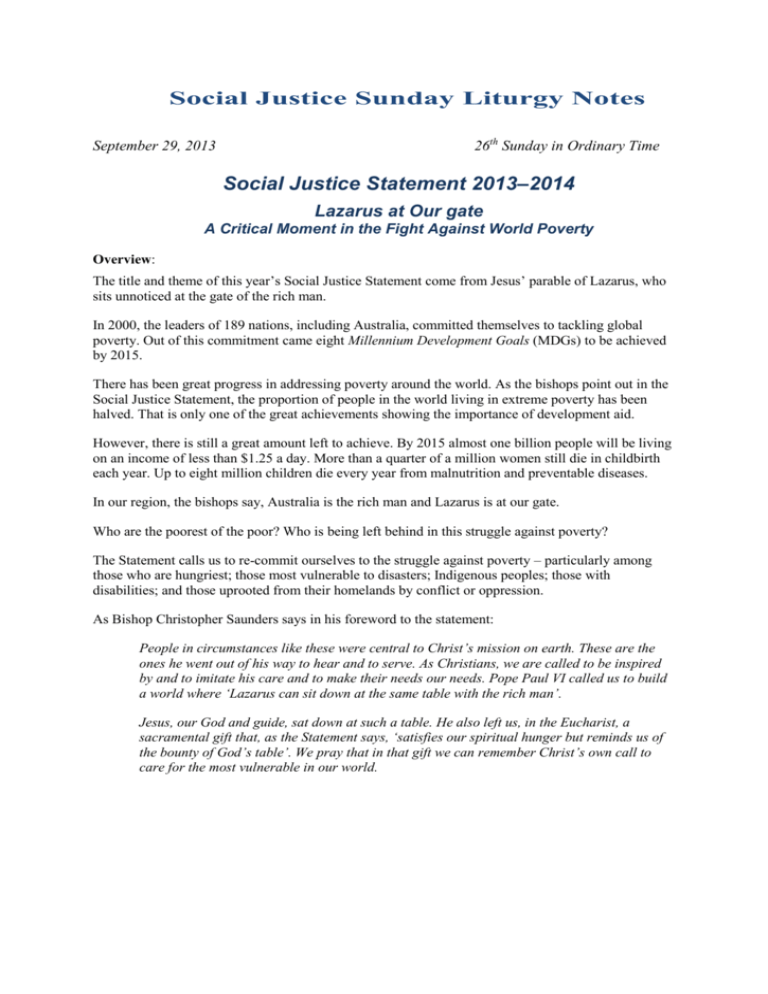
Social Justice Sunday Liturgy Notes September 29, 2013 26th Sunday in Ordinary Time Social Justice Statement 2013–2014 Lazarus at Our gate A Critical Moment in the Fight Against World Poverty Overview: The title and theme of this year’s Social Justice Statement come from Jesus’ parable of Lazarus, who sits unnoticed at the gate of the rich man. In 2000, the leaders of 189 nations, including Australia, committed themselves to tackling global poverty. Out of this commitment came eight Millennium Development Goals (MDGs) to be achieved by 2015. There has been great progress in addressing poverty around the world. As the bishops point out in the Social Justice Statement, the proportion of people in the world living in extreme poverty has been halved. That is only one of the great achievements showing the importance of development aid. However, there is still a great amount left to achieve. By 2015 almost one billion people will be living on an income of less than $1.25 a day. More than a quarter of a million women still die in childbirth each year. Up to eight million children die every year from malnutrition and preventable diseases. In our region, the bishops say, Australia is the rich man and Lazarus is at our gate. Who are the poorest of the poor? Who is being left behind in this struggle against poverty? The Statement calls us to re-commit ourselves to the struggle against poverty – particularly among those who are hungriest; those most vulnerable to disasters; Indigenous peoples; those with disabilities; and those uprooted from their homelands by conflict or oppression. As Bishop Christopher Saunders says in his foreword to the statement: People in circumstances like these were central to Christ’s mission on earth. These are the ones he went out of his way to hear and to serve. As Christians, we are called to be inspired by and to imitate his care and to make their needs our needs. Pope Paul VI called us to build a world where ‘Lazarus can sit down at the same table with the rich man’. Jesus, our God and guide, sat down at such a table. He also left us, in the Eucharist, a sacramental gift that, as the Statement says, ‘satisfies our spiritual hunger but reminds us of the bounty of God’s table’. We pray that in that gift we can remember Christ’s own call to care for the most vulnerable in our world. Liturgy Notes The following notes are provided to assist in linking the 26th Sunday in Ordinary Time with Social Justice Sunday 2013 and the Social Justice Statement 2013–14. Welcome Today is Social Justice Sunday. The Australian Catholic Bishops have published a Social Justice Statement, titled: ‘Lazarus at Our Gate: A critical moment in the fight against world poverty’ The title comes from the Gospel reading for today. In confronting the challenge of world poverty, we need to acknowledge the undoubted successes of the Millennium Development Goals campaign. These achievements also call us to think hard about the important tasks still ahead of us. The benchmark for extreme poverty is an income of $1.25 per day. The Statement calls us to ask: Can we as Christians really say that that is sufficient? Can we stand by while each year a quarter of a million women die in childbirth, or while malnutrition kills eight million children and confers a legacy of disease and stunted growth on hundreds of millions more? It calls us to re-commit ourselves to the struggle against poverty worldwide, especially for the most vulnerable and marginalised people. Readings The Readings for the 26th Sunday in Ordinary Time (Year C) relate strongly to the message of this year’s Social Justice Statement. Social Justice is about ensuring that all have a fair share of this world’s goods, and that all are treated with respect and dignity. It is about reading the signs of the time already before us – and taking action for justice as individuals, as communities and as a nation. Amos 6:1, 4-7 The Lord says this: ‘Woe to those ensconced so snugly in Zion.’ Amos is berating those ‘sprawling’ in their material comforts and ignoring the needs of the poor in the society. Psalm 146 In contrast, the Psalm praises God who is ‘just to those who are oppressed.’ 1 Timothy 6:11-16 St Paul exhorts the people to be faithful to their calling and to the commitment they made before many witnesses. Gospel: Luke 16:19-31 Jesus tells the parable of the rich man and Lazarus to try to get the people to understand that they do not need any more signs – the message is clearly before them. Like the rich man, we can spend our time waiting for the big signs and miss all the small ones - the obvious truths at our gate. Reflection on the readings/Homily Notes Reflection on the Gospel Luke 16:19-31 26th Sunday in Ordinary Time C The Gospel parables have a way of pursuing those who lend themselves to caricature. They also have a way of inviting the self-important to take a good look at themselves. The exploitative wealthy are a particular target in Luke’s community: ‘Woe to you who are rich …’ This Sunday’s parable presents a nasty unnamed character who is mega rich and who uses his wealth to support a totally selfish lifestyle. He dresses in the finest clothes and feasts extravagantly on a daily basis. He has no concern or interest in the destitute and badly wounded man, Lazarus, who has been cast at his gate and who longs for a share of whatever falls (‘scraps’ in our translation) from the rich man’s table. The reference here is probably to the pita bread commonly used by diners at banquets to wipe their hands. The bread would be discarded after use and snapped up by the dogs. Lazarus has a reasonable hope that, even if the servants fail to offer him the leftovers, the dogs might share their daily fare. Begging for food was often the sole means of sustenance for those with disabilities. There are strong hints that Lazarus has a serious disability: he is ‘sorely wounded’; he is ‘cast’ at the gate, by family or friends; he has no capacity to prevent the dogs from licking his sores. Lazarus dies and is transported by angels into the arms of Israel’s iconic ancestor, Abraham. In contrast, the rich man dies and suffers the torment of Hades. There is no mention of angels to transport him to the place of his ancestors. The rich man’s suffering is exacerbated by the vision of the one whose needs he ignored in life, now ‘a long way off’ in Abraham’s embrace. Earlier in Luke’s story, Jesus has declared the bent-over woman to be a daughter Abraham. Later, he will call the toll-collector Zacchaeus a ‘son of Abraham’. To be ‘of Abraham’ is to be true to the tradition inaugurated by Israel’s ancestor in faith. It is to ‘hear’ Moses and the prophets and their call to justice and right relationship. Riches belong, not to the few, but to all of God’s people. If they are all-consuming, they destroy our capacity to see or hear what really matters. They are not much use in the afterlife. All the honour and status they might bring in life are quite worthless in the final analysis. The rich man comes to this realisation a bit too late. Even then, there is no recognition of the poor man’s shared humanity, only a desire to benefit from his services. Veronica Lawson rsm Social Justice Statement Lazarus at our Gate. pp 12-14 Particularly the final section: To be welcomed and embraced, p 14 Prayers of the Faithful Introduction: We pray to the God of all creation who has given us the beautiful land we call Australia: Rich in ancient culture and tradition, rich in landscape, plants and animal life; rich in resources, laws and social structure, offering safety and opportunity. May we use these gifts well. Teach us to hear the message of Pope Francis, to be a church of the poor and for the poor, to act justly so all may come to the table and to weep for those who perish before they are invited. Let us pray to the Lord: R. Lord hear our prayer May all church and civic leaders lead by example and challenge us to see those who are at our gates. Let us pray to the Lord: R. Lord hear our prayer Where there is hunger in our world may we share our food and resources and contribute our skills and knowledge to create a sustainable food supply. Let us pray to the Lord: R. Lord hear our prayer Where there is disaster may we respond quickly and generously to bring relief to those injured and deprived of homes and help them to rebuild their lives and communities. Let us pray to the Lord: R. Lord hear our prayer Where there are people who are disabled may we see them first as people and work tirelessly to ensure they are always included and have the resources to reach their full potential. Let us pray to the Lord: R. Lord hear our prayer Where people are displaced from their own lands, especially those who seek refuge on our shores, may we dare to put ourselves in their shoes and welcome them to share in the life gifted to us. Let us pray to the Lord: R. Lord hear our prayer Where Indigenous communities are displaced in their own land, may we acknowledge the wrongs of the past, recognise the richness of their culture and empower all Indigenous Peoples to determine their own future. Let us pray to the Lord: R. Lord hear our prayer God of all creation, give us clear eyes to see the whole world so that we may never take for granted the gifts you have given or think they belong to us alone. Let us pray to the Lord: R. Lord hear our prayer Give us open hearts to reach out from our comfort and open our gates to walk in new solidarity with our neighbours. We make this prayer in Jesus’ name. Amen For the Parish Bulletin We celebrate Social Justice Sunday on 29th September. The 2013–14 Social Justice Statement is titled ‘Lazarus at Our Gate: A critical moment in the fight against world poverty’. The Statement urges all Australians to focus on our obligation to help the world’s poorest people and to work to overcome poverty wherever it is found. Although progress has been made over the last decade in the fight against extreme poverty, one billion people still live on less than $1.25 per day, and 20% of the world’s poor people live in countries near Australia. For further information about the Social Justice Statement, visit the Australian Catholic Social Justice Council website www.socialjustice.catholic.org.au or call (02) 8306 3499 The ACSJC website has resources available for download free of charge. They include a PowerPoint presentation and Education Resources suitable for parish groups schools. Suggested Music The Beatitudes (Peter Kearney) Bearers of Peace (B. Farrell) Bread of life, Hope for the World (B. Farrell) Bring Forth the Kingdom (M. Haugen) Christ Be Our Light (B. Farrell) City of God (St Louis Jesuits) Come to the Feast (M. Haugen) Community of Christ (B. Farrell) Harvest of Justice (D. Haas) No Right to Crush God’s People (Peter Kearney) Share Your Bread with the Hungry (D.Haas) The God of Second Chances (D. Haas) The Lord Hears the Cry of the Poor (St Louis Jesuits) Voices That Challenge (D. Haas) We Are Called (D. Haas) Suggestion: The following prayer, issued with the Statement as a prayer card, could be given to parishioners or printed on the bulletin for parishioners to keep and use. Prayer for Solidarity God of all creation You have given us the beautiful land we call Australia. Rich in ancient culture and tradition, Rich in landscape, plants and animal life; Rich in resources, laws and social structure, Offering safety and opportunity. Teach us to see those who are at our gates, To act justly so all may come to the table and To weep for those who perish before they are invited. Where there is hunger in our world May we share our food and resources and contribute our skills and knowledge to create a sustainable food supply. Where there is disaster May we respond quickly and generously To bring relief to those injured and deprived of homes and help them to rebuild their lives and communities. Where there are people who are disabled May we see them first as people and work tirelessly to ensure they are always included and have the resources to reach their full potential. Where people are displaced from their own lands, Especially those who seek refuge on our shores, May we dare to put ourselves in their shoes And welcome them to share in the life gifted to us. Where Indigenous communities are displaced in their own land, May we acknowledge the wrongs of the past, Recognise the richness of their culture And empower all Indigenous Peoples to determine their own future. God of all creation Give us clear eyes to see the whole world So that we may never take for granted the gifts you have given Or think they belong to us alone. Give us open hearts to reach out from our comfort and open our gates To walk in new solidarity with our neighbours.


